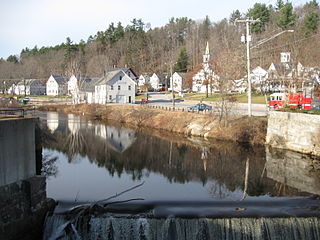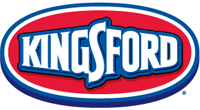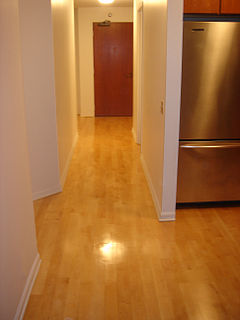Related Research Articles

A kiln is a thermally insulated chamber, a type of oven, that produces temperatures sufficient to complete some process, such as hardening, drying, or chemical changes. Kilns have been used for millennia to turn objects made from clay into pottery, tiles and bricks. Various industries use rotary kilns for pyroprocessing—to calcinate ores, to calcinate limestone to lime for cement, and to transform many other materials.

Lumber, also known as timber, is wood that has been processed into beams and planks, a stage in the process of wood production. Lumber is mainly used for structural purposes but has many other uses as well.

Acrylonitrile butadiene styrene (ABS) (chemical formula (C8H8)x·(C4H6)y·(C3H3N)z) is a common thermoplastic polymer. Its glass transition temperature is approximately 105 °C (221 °F). ABS is amorphous and therefore has no true melting point.

Engineered wood, also called mass timber, composite wood, man-made wood, or manufactured board, includes a range of derivative wood products which are manufactured by binding or fixing the strands, particles, fibres, or veneers or boards of wood, together with adhesives, or other methods of fixation to form composite material. The panels vary in size but can range upwards of 64 by 8 feet and in the case of cross-laminated timber (CLT) can be of any thickness from a few inches to 16 inches (410 mm) or more. These products are engineered to precise design specifications, which are tested to meet national or international standards and provide uniformity and predictability in their structural performance. Engineered wood products are used in a variety of applications, from home construction to commercial buildings to industrial products. The products can be used for joists and beams that replace steel in many building projects. The term mass timber describes a group of building materials that can replace concrete assemblies. Broad-base adoption of mass timber and their substitution for steel and concrete in new mid-rise construction projects over the next couple decades has the potential of turning timber buildings into a global carbon sink, which could help mitigate climate change.

Wilton is a town in Hillsborough County, New Hampshire, United States. The population was 3,677 at the 2010 census. Like many small New England towns it grew up around water-powered textile mills, but is now a rural bedroom community with some manufacturing and service employment. Wilton is home to the High Mowing School, a private preparatory school.

A sawmill or lumber mill is a facility where logs are cut into lumber. Modern sawmills use a motorized saw to cut logs lengthwise to make long pieces, and crosswise to length depending on standard or custom sizes. The "portable" sawmill is of simple operation. The log lies flat on a steel bed, and the motorized saw cuts the log horizontally along the length of the bed, by the operator manually pushing the saw. The most basic kind of sawmill consists of a chainsaw and a customized jig, with similar horizontal operation.

Building material is material used for construction. Many naturally occurring substances, such as clay, rocks, sand and wood, even twigs and leaves, have been used to construct buildings. Apart from naturally occurring materials, many man-made products are in use, some more and some less synthetic. The manufacturing of building materials is an established industry in many countries and the use of these materials is typically segmented into specific specialty trades, such as carpentry, insulation, plumbing, and roofing work. They provide the make-up of habitats and structures including homes.

A log house, or log building, is a structure built with horizontal logs interlocked at the corners by notching. Logs may be round, squared or hewn to other shapes, either handcrafted or milled. The term "log cabin" generally refers to a smaller, more rustic log house, such as a hunting cabin in the woods, that may or may not have electricity or plumbing.

Wood-plastic composites (WPCs) are composite materials made of wood fiber/wood flour and thermoplastic(s) such as polythene (PE), polypropylene (PP), polyvinyl chloride (PVC), or polylactic acid (PLA).

Particle board, also known as chipboard, is an engineered wood product manufactured from wood chips or jutestick chips and a synthetic resin or other suitable binder, which is pressed and extruded. Particle board is often confused with oriented strand board, a different type of fiberboard that uses machined wood flakes and offers more strength.

New Hampshire Route 31 is a 56.148-mile-long (90.361 km) north–south state highway in southern New Hampshire. It runs from Mason on the Massachusetts border, where, as Greenville Road, the road becomes Massachusetts Route 31. It passes through Greenville, Wilton, Lyndeborough, Greenfield, Bennington, Antrim, Hillsborough, Windsor, and Washington, reaching its northern terminus of Goshen at New Hampshire Route 10.

Wood drying reduces the moisture content of wood before its use. When the drying is done in a kiln, the product is known as kiln-dried timber or lumber, whereas air drying is the more traditional method.

Kingsford is a brand of charcoal briquette used for grilling, along with related products. Established in 1920, the brand is owned by The Clorox Company. Currently, the Kingsford Products Company remains the leading manufacturer of charcoal in the United States, with 80% market share. More than 1 million tons of wood scraps are converted into charcoal briquettes annually.

Wood flooring is any product manufactured from timber that is designed for use as flooring, either structural or aesthetic. Wood is a common choice as a flooring material and can come in various styles, colors, cuts, and species. Bamboo flooring is often considered a form of wood flooring, although it is made from a grass (bamboo) rather than a timber.

Tire recycling, or rubber recycling, is the process of recycling waste tires that are no longer suitable for use on vehicles due to wear or irreparable damage. These tires are a challenging source of waste, due to the large volume produced, the durability of the tires, and the components in the tire that are ecologically problematic.

Forests cover about one-third of Ghana's total area, with commercial forestry concentrated in the southern parts of Ghana.
Granulation is the process of forming grains or granules from a powdery or solid substance, producing a granular material. It is applied in several technological processes in the chemical and pharmaceutical industries. Typically, granulation involves agglomeration of fine particles into larger granules, typically of size range between 0.2 and 4.0 mm depending on their subsequent use. Less commonly, it involves shredding or grinding solid material into finer granules or pellets.
Lumber and wood products, including timber for framing, plywood, and woodworking, are created in the wood industry from the trunks and branches of trees through several processes, commencing with the selection of appropriate logging sites and concluding with the milling and treatment processes of the harvested material.
L.N. Dantzler Lumber Company began as a small sawmill owned by William Griffin in Moss Point, Mississippi. L.N. Danzler bought it in the 1870s and, with two sons, incorporated the business in 1888. Originally, the main business was the manufacture of lumber from southern yellow pine, but in 1949, the company switched to tree farming of southern pines and sold timber by selective cutting to yield a variety of wood products. The family-owned business prospered for 75 years but was sold to International Paper Company in 1966.

The Hillsborough Mills are a historic textile manufacturing complex at 37 Wilton Road in western Milford, New Hampshire, near its town line with Wilton. The oldest buildings of the brick mill complex were built in 1866 as a carpet-making operation. This business failed in 1874, but the complex was acquired by other textile interests, and eventual saw success producing carpet yarns, and blankets for horses and bedding. The mills were closed in 1970, and have since been adapted for other uses. The complex was listed on the National Register of Historic Places in 2014.
References
- Stone, Tracie. "New Law Gives Small Business Help on Environmental Rules." The New Hampshire Business Review 19 Aug. 2005: n. pag.16 Print.
- "A History of Wilton, New Hampshire Adapted for Use in the Fourth Grade". Wilton NH Library. p. Chapter V Wilton Businesses — Past and Present. Archived from the original on Aug 12, 2005.
- Rotch, Patty. "Recycling - An Old Story." Forest Notes Number 129 (1977): 22-24. Print.